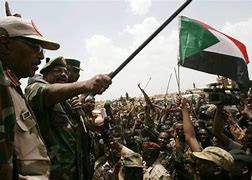Sudan fighting: Civilian death toll rising as thousands flee
Monday, April 24, 2023
Written by Mohamed Osman in Khartoum & Oliver Slow in London, BBC News
Categories: ASCF News

The civilian death toll in Sudan is increasing daily, the Red Cross has said, while also warning of water and electricity shortages.
Alyona Synenko, from ICRC, said the situation had become "untenable" for civilians, amid fighting between the regular army and a paramilitary force.
About 10,000 refugees have reportedly entered South Sudan - and some have fled to other neighbouring nations.
Many countries have evacuated diplomats and citizens from the capital Khartoum.
People were making "desperate attempts" to escape Sudan, said Ms Syneko, regional spokesperson for the International Committee of the Red Cross.
Many were trapped without food and clean water, and hospitals had stopped functioning, she told the BBC in an interview from Kenya.
"This is extremely dangerous, and we see the toll of civilian deaths going higher and higher every day," she said.
More than 400 people have died in the conflict, and thousands have been injured, according to the latest tally from the World Health Organization. It is feared the true toll is much higher.
Many of those who have left Khartoum have headed to other parts of the country where they have family ties - leaving parts of the city center completely deserted.
Others have gone north to Egypt by bus, or headed south. Officials in northern South Sudan said about 10,000 refugees had arrived from Sudan in recent days.
They said those who crossed the border were from Eritrea, Kenya and Uganda - as well as from Sudan and South Sudan.
South African diplomat Clayson Monyela said the fighting meant that all routes out of Khartoum were "risky and dangerous".
"The airport remains closed, the fighting continues," he told the BBC. He reiterated a call for a ceasefire to allow people to leave, and aid to enter.
Aid groups have warned that fighting in Sudan has led to a huge humanitarian crisis in the country.
Several ceasefires that seemingly been agreed have been ignored - including a three-day pause to mark the Muslim holiday of Eid al-Fitr, which started on Friday.
The UN's World Food Programme has warned that the violence could "plunge millions" more into hunger in a country where a third of the population "already struggles to get enough to eat".
Sudan was in the midst of an "internet blackout" with connectivity at 2% of ordinary levels, monitoring group NetBlocks said on Monday. In Khartoum, the internet has been down since Sunday night.
Sources said the Rapid Support Forces (RSF) - the paramilitary group fighting the army - cut one provider because it wanted to prevent its enemy from streaming programmes onto national television.
Meanwhile, water and electricity have been restored to some parts of the capital, but not all of them.
Over the past several days, multiple countries have been evacuating diplomats and civilians from Khartoum, where much of the fighting has been concentrated.
The US said it had airlifted fewer than 100 people by helicopter on Sunday in a "fast and clean" operation.
The American embassy in Khartoum is now closed, and a tweet on its official feed says it is not safe for the government to evacuate private US citizens.
The UK government managed to airlift British diplomats and their families out of the country. Foreign Minister James Cleverly said options to evacuate remaining Britons were "severely limited".
Turkey - a key player in Sudan - began evacuation efforts by road from the southern city of Wad Medani on Sunday, but plans from one site in Khartoum were postponed after a nearby "explosion".
More than 1,000 European Union citizens had been taken out of Sudan, according to an update from the EU's foreign policy chief on Monday morning. Canada has evacuated its diplomatic staff.
Earlier, more than 150 people - mostly citizens of Gulf countries, as well as Egypt, Pakistan and Canada - were evacuated by sea to Saudi Arabia.
Long lines of UN vehicles and buses were seen leaving Khartoum on Sunday, heading east towards Port Sudan on the Red Sea and carrying "citizens from all over the world", a Sierra Leonean evacuee told AFP news agency.
Among those still stuck in Khartoum - a city of six million people - there have been desperate calls for help from many foreign students, from Africa, Asia and the Middle East.
As well as Khartoum, the western region of Darfur - where the RSF first emerged - has also been badly affected by the fighting.
The UN has warned that up to 20,000 people - mostly women and children - have fled Sudan to seek safety in Chad, across the border from Darfur.
In other parts of the country, some semblance of normalcy has emerged.
In Omburdman, north of Khartoum, there has been less gunfire and explosions than in previous days, possibly to allow civilians to leave. Heavy fighting outside the army headquarters has stopped.
As a result, for the first time since hostilities broke out more than a week ago, women and children have been out on the streets, visiting neighbours and going to markets, which still have some basic supplies such as oil and wheat. There are long queues outside the few bakeries that remain open.
Read the full article here




